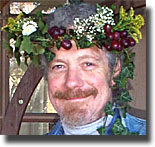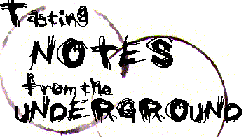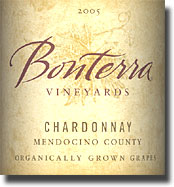 2005
Bonterra Mendocino Chardonnay, 13.7% alc., $14.99: Medium straw with a
tinge of lime in color; the pear and sweet pea aromatics follow through on the
palate with an added note of lime, along with moderate oak that accents but
never dominates the flavors. Medium-full to full bodied, with good intensity,
acid structure and length; what’s not to like?
2005
Bonterra Mendocino Chardonnay, 13.7% alc., $14.99: Medium straw with a
tinge of lime in color; the pear and sweet pea aromatics follow through on the
palate with an added note of lime, along with moderate oak that accents but
never dominates the flavors. Medium-full to full bodied, with good intensity,
acid structure and length; what’s not to like?
Find this wine
2006 Bonterra Sauvignon Blanc,
52% Lake County, 48% Mendocino, 13.3% alc., $14.99: Medium straw with a tinge of
peach in color; flavors and aromas of green apple, grapefruit, fig and boxwood,
all with a nice touch of minerality and good varietal character. Good presence,
excellent acids and nice length; crisp, tart and food friendly, pairing well
with some rotisserie chicken. Find this wine
2005 Bonterra Mendocino Viognier,
85% Viognier, 10% Marsanne, 3% Roussanne, 2% Muscat, 13.9% alc., $20.99: Medium
straw color with a tinge of lime, with intense green apple, peach and apricot
flavors and aromas laced with a modest note of oak; the green apple component
adds a slight tartness to offset the ripeness of the peach and apricot and
there’s an almost gewürztraminer-like litchi quality to this, but only the
barest trace of the more normal honeysuckle that usually is associated with
Viognier. Medium-full to full-bodied, with good acids and length, this may not
exactly show varietal typicity, but I like it well enough to have taken a second
and third pour after my initial glass. Probably my favorite of these three
Bonterra whites. Find this wine
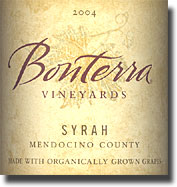 2004
Bonterra Mendocino Syrah, 14.5% alc., $20.99: Dark garnet fading to
purple-pink at the rim; sweet spicy oak over ripe black plum, blackberry and
even some black raspberry in both flavor and aroma. Full bodied, with rich
fruit, good intensity, smooth texture, moderate structure and good length on the
finish. If it doesn’t show that much varietal character, it’s still a solid red
that delivers the goods for the price, it’s ready to drink now and just might be
my favorite of these Bonterra reds. Find this wine
2004
Bonterra Mendocino Syrah, 14.5% alc., $20.99: Dark garnet fading to
purple-pink at the rim; sweet spicy oak over ripe black plum, blackberry and
even some black raspberry in both flavor and aroma. Full bodied, with rich
fruit, good intensity, smooth texture, moderate structure and good length on the
finish. If it doesn’t show that much varietal character, it’s still a solid red
that delivers the goods for the price, it’s ready to drink now and just might be
my favorite of these Bonterra reds. Find this wine
2004 Bonterra Mendocino Merlot,
85% Merlot, 10% Syrah, 3% Petite Sirah, 2% Cabernet Sauvignon, 13.9% alc.,
$17.99: Dark color from rim to rim; moderately toasty, spicy oak over modest
black currant and berry with a hint of coffee on the nose. Plenty more of
everything on the palate, with the coffee “component” emerging a little more
along with some subtle underbrush. Medium-full to full bodied, with good depth
and balance, decent structure, medium-plus intensity and no rough edges. The
inclusion of Syrah and Petite Sirah in the blend is intriguing, and while this
should hold well for a year or two, like all of these, why wait? It’s ready to
go now. Find this wine
2004 Bonterra Mendocino
Cabernet Sauvignon, 84% Cabernet Sauvignon, 9% Syrah, 5% Petite Sirah,
2% Merlot, 13.9% alc., $17.99: Dark color from rim to rim; moderate sweet oak
over black currant and blackberry aromas, with some subtle cocoa and a hint of
tar that gradually recedes and evaporates. Flavors echo and expand, sans tar,
being smooth, even suave in texture; full-bodied and fairly rich in character,
with moderate tannins and good density and length. Again, the blend is
interesting, but as with the Merlot, it works quite well, and again, no reason
to sit on this one, because it’s a drink-me-now kind o’ wine, and my better
half’s favorite of the bunch. Find this wine
2005 Bonterra Mendocino Zinfandel,
14.6% alc., $17.99: This isn’t an in-your-face zin, but rather a well mannered,
expressive one, offering moderately toasty oak over spicy, creamy raspberry
accented with subtle notes of briar and bramble. Just enough structure to hold
it all together nicely, with moderate tannins and excellent acids, and it pairs
well with a plate of organic pasta with a tomato sauce. Find this wine
The constant with all things Bonterra is that they’re made to drink and not to
age, and that’s not a bad thing with wines of this quality.
Lolonis Vineyards
The first time I came across the name Lolonis was back in the late ‘70s. I had
purchased a single vineyard Fetzer Mendocino Zinfandel designated
“Lolonis Vineyard,” and it was quite tasty. Back then, the Lolonis family was
supplying organically grown grapes to other concerns, and would not establish a
winery of their own until 1982.
The second time I came across the name Lolonis was a few years ago, when I had
the opportunity to spend some time talking with the winery’s co-founder,
Petros Lolonis,
who paid me a visit
while he was on the road promoting his wines. He told me briefly about his
family’s history in Mendocino, a story that goes something like this:
Petros’ father began planting grape vines in Mendocino’s Redwood Valley
over 70 years ago, and the family has carried on with the endeavor, selling
grapes to Christian Brothers during Prohibition for sacramental wine, and
afterwards, to the likes of Charles Krug, Geyser Peak, Italian
Swiss Colony, Parducci and Sebastiani during the ‘40s and
‘50s. In the mid-50s, Petros’ brother Nick
convinced their father Tryfon to switch to
organic farming, and they’ve practicing those methods ever since. Beneficial
predators such as ladybugs are used instead of pesticides, and cover crops are
also used to keep pests away from vines, as well as to return nutrients to the
soils. In 1982, Petros and his brother Ulysses
established the Lolonis winery, which now produces a range of bottlings, both
red and white, which are made by Lori Knapp.
I also had the opportunity to taste the Lolonis wines with Petros, and while I
liked what I tried well enough, I thought most were missing a certain
“something.” Happily, these last five we tried not long ago were quite enjoyable
with no reservations whatsoever. Here’re my notes on those:
2004 Lolonis Fumé Blanc, 51%
Mendocino County, 49% Lake County, 13.8% alc., $13.99: Medium color, with
slightly tart green apple, pear and melon flavors and aromas that show a touch
of mineral, all with good cut and weight. There’s only moderate Sauvignon
character here; I wonder if I might not guess that this is Pinot Gris if served
blind. Still, it has good presence and intensity, and matches well with some
pan-fried salmon. Sourced from 35-40 year-old vines; sees no oak, fermented in
stainless steel.
Find this wine
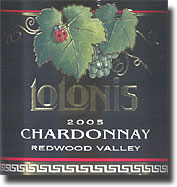 2005
Lolonis Redwood Valley Chardonnay, 14.8% alc., $19.99: Medium color,
with noticeable, though not excessive oak (60% of the wines was barrel fermented
in French wood, with the balance in stainless steel). It offers good rich
Chardonnay character, with flavors and aromas reminiscent of pears and toffee on
a medium-full to full bodied frame, with good depth and acids. The toffee-like
character gives this the defining trait in its personality, and if it were any
stronger, I might not like this as well as I do, but a deft hand was obviously
used in making this. A good glass of white for a variety of fish and fowl
dishes, or just for warm weather sipping. Find this wine
2005
Lolonis Redwood Valley Chardonnay, 14.8% alc., $19.99: Medium color,
with noticeable, though not excessive oak (60% of the wines was barrel fermented
in French wood, with the balance in stainless steel). It offers good rich
Chardonnay character, with flavors and aromas reminiscent of pears and toffee on
a medium-full to full bodied frame, with good depth and acids. The toffee-like
character gives this the defining trait in its personality, and if it were any
stronger, I might not like this as well as I do, but a deft hand was obviously
used in making this. A good glass of white for a variety of fish and fowl
dishes, or just for warm weather sipping. Find this wine
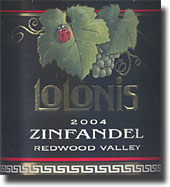 2004
Lolonis Redwood Valley Zinfandel, 14.8% alc., $19.99: A pleasing dark
color from rim to rim, with red and black raspberry aromatics accented with just
the right kiss of sweet oak. Flavors echo nicely, with good depth, balance,
structure and length. Some subtle earth and bramble lay a fine foundation in
support of the attractive fruit; despite good acids and tannins, this has a
somewhat creamy texture, and with air, the fruit gains a certain creamy quality
as well. Zinfandel has always been my favorite of Lolonis’ wines, and this one
gives further evidence as to just why. Think pizza, pasta, burgers and BBQ with
this one. Find this wine
2004
Lolonis Redwood Valley Zinfandel, 14.8% alc., $19.99: A pleasing dark
color from rim to rim, with red and black raspberry aromatics accented with just
the right kiss of sweet oak. Flavors echo nicely, with good depth, balance,
structure and length. Some subtle earth and bramble lay a fine foundation in
support of the attractive fruit; despite good acids and tannins, this has a
somewhat creamy texture, and with air, the fruit gains a certain creamy quality
as well. Zinfandel has always been my favorite of Lolonis’ wines, and this one
gives further evidence as to just why. Think pizza, pasta, burgers and BBQ with
this one. Find this wine
2004 Lolonis Redwood Valley
Merlot, 14.2% alc., $19.99: Dark color, with pretty red and black
currant and berry flavors and aromas complemented with understated oak; rich and
round, with some subtle earth underneath and a smoothness that never descends
into the kind of wimpy, boring mediocrity that gives so much over-cropped
California Merlot such a bad reputation. The wine has structure, balance and an
engaging personality, with more than enough depth to stand up to a grilled,
medium rare rib eye steak. Find this wine
2004 Lolonis Redwood Valley Cabernet Sauvignon, 14.2% alc., $18.99: Dark color, with deeper,
darker black currant and black plum character than the Merlot displays, and more
earth underneath, although it’s in perfect proportion to everything else;
there’s some oak here as well, but it too is balanced and complements the fruit
rather than dominating or detracting. Full bodied and well structured with rich
fruit that lingers nicely on the palate; this has power without going over the
top, more like a practiced swimmer than a weight lifter. This is a wine that I’d
like to enjoy with a plate of some good steak tartare but that’s a treat that I
rarely indulge in these days, so I suppose a good medium rare Porterhouse steak
would serve as an acceptable substitute. Find this wine
Sobon
Estate
Shirley and Leon
Sobon founded Shenandoah Vineyards in 1977, and I will readily
testify to having enjoyed more than a few of their well-priced, everyday
Zinfandels back in the ‘80s and early ‘90s. In 1989, Shirley and Leon bought
themselves a second winery as a 30th Wedding Anniversary present to each other,
the historic D’Agostini facility, one of the Golden State’s oldest, and
renamed it Sobon Estate. The purchase included vineyard property, especially
some of the old vine Zinfandel that Amador County has been known for going back
to the ‘70s, when many of those vineyards were already old. That same year, they
made the decision to go organic, and now farm 125 acres of grapes and walnuts
without herbicides, pesticides, or chemical fertilizers. Their wines are made by
conventional means, using a minimum of sulfites (15-20 parts free per million),
reasoning that they are necessary to maintain freshness, color, stability,
ageability, and appeal. The Sobons use 600 to 800 tons of compost every year,
all made from grape skins, seeds, and stems; their wines are made from the best
grapes that the family grows, and it shows in the glass.
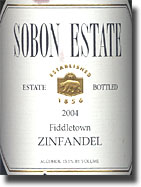 2004
Sobon Estate Amador Zinfandel Fiddletown Lubenko Vineyard, 15.1% alc.,
$19.99: Dark color fading to pink at the rim, with an effusive jammy nose of
very ripe black raspberry, mulberry and sweet oak. The big flavors echo loudly,
seeming almost sweet on entry, but turning decidedly dry by the finish. With a
little air, briary-brambly qualities that were once common qualities in
Zinfandel before the ultra-ripe, ultra-jammy Turley-esque style became all the
rage in the mid ‘90s emerges along with a hint of root beer to add some nice
complexity; the wine is well structured, with deceptive tannins and zippy
acidity. This is a fine zin now, blending both the earthier style that those of
us back in the ‘70s and ‘80s learned to love the grape for with the riper,
jammier character that never goes over the top. There’s good potential here for
further development with at least a few years in the cellar, but it’s already
drinking very well. Lubenko Vineyard was planted in 1910, at an elevation
of 1,900 feet, making this a true “old vine zin.” Find this wine
2004
Sobon Estate Amador Zinfandel Fiddletown Lubenko Vineyard, 15.1% alc.,
$19.99: Dark color fading to pink at the rim, with an effusive jammy nose of
very ripe black raspberry, mulberry and sweet oak. The big flavors echo loudly,
seeming almost sweet on entry, but turning decidedly dry by the finish. With a
little air, briary-brambly qualities that were once common qualities in
Zinfandel before the ultra-ripe, ultra-jammy Turley-esque style became all the
rage in the mid ‘90s emerges along with a hint of root beer to add some nice
complexity; the wine is well structured, with deceptive tannins and zippy
acidity. This is a fine zin now, blending both the earthier style that those of
us back in the ‘70s and ‘80s learned to love the grape for with the riper,
jammier character that never goes over the top. There’s good potential here for
further development with at least a few years in the cellar, but it’s already
drinking very well. Lubenko Vineyard was planted in 1910, at an elevation
of 1,900 feet, making this a true “old vine zin.” Find this wine
2004 Sobon Estate Amador Zinfandel Rocky Top, 15.1% alc., $19.99: Dark color, and not as ripe or
as effusive aromatically as the Fiddletown bottling; rich, earthy black
raspberry flavors and aromas shaded with some briar/bramble, a hint of root beer
and moderate oak at most. Full bodied, with a smooth texture, good depth and
structure and not at all over the top. Even more in the old style than the
Fiddletown, and with a few years in the cellar, it should take on a nice
claret-like character, but it already drinks very well and makes a nice match
for duck quesadillas. Find this wine
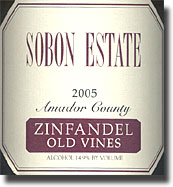 2005
Sobon Estate Amador Zinfandel Old Vines, 14.9% alc., $11.99: Dark color,
with an earthy briar/bramble character that dominates the blackberry and black
raspberry nose; the flavors echo and expand with that old time feeling, and with
air, some root beer and coffee-mocha emerge as well. Less fruit forward than the
two higher priced bottlings, but by no means fruit deficient; smooth in texture,
with unobtrusive tannins and good acidity to at least hold, if not improve this
over the next few years, but I like it right now and probably wouldn’t wait.
2005
Sobon Estate Amador Zinfandel Old Vines, 14.9% alc., $11.99: Dark color,
with an earthy briar/bramble character that dominates the blackberry and black
raspberry nose; the flavors echo and expand with that old time feeling, and with
air, some root beer and coffee-mocha emerge as well. Less fruit forward than the
two higher priced bottlings, but by no means fruit deficient; smooth in texture,
with unobtrusive tannins and good acidity to at least hold, if not improve this
over the next few years, but I like it right now and probably wouldn’t wait.
Find this wine
2005 Sobon Estate Amador Zinfandel Hillside, 14.9% alc., $11.99: Clean dark color, with
blackberry, black raspberry and a little coffee and bramble on the
less-than-effusive nose; there’s plenty more of the same in the mouth, however,
and while this is certainly the earthiest of the five wines noted here, it has
more-than-ample fruit to round it out nicely. Good depth, structure and length,
and yet another slightly different take on the “Amador style” of Zinfandel; if
it’s less expressive than the Old Vines at the same price, it’s only by a
little, and I’d be happy to bring this “throwback” home for dinner any old time.
There is a consistent set of elements running through these four zins, but
still, they all have their own distinctive personality. But Zinfandel isn’t all
that Sobon produces…Find this wine
2005 Sobon Estate Amador Syrah,
14.1% alc., $15.99: This offers expressive earthy, coffee, toast, bacon, black
plum, blackberry and balsa aromatics that follow through on the palate with a
decidedly dry character, good varietal character and good tannic and acidic
structure; should evolve for at least three to five years down the road, yet
more than merely “approachable” for immediate enjoyment. A very solid $16 Cal
Syrah. Find this wine
Reporting from Day-twah,


